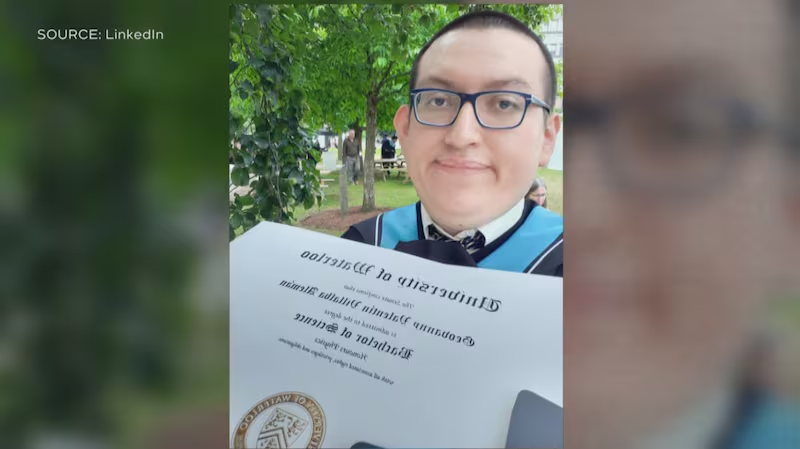Geovanny Villalba-Aleman will serve more time in prison for stabbing three people at the University of Waterloo.
In March, a judge sentenced him to 11 years behind bars for the 2023 attack. Villalba-Aleman admitted he went into a gender studies class and stabbed two students and a professor. He pleaded guilty to two counts of aggravated assault, one count of assault causing bodily harm and one count of assault with a weapon. Villalba-Aleman also faced a terrorism charge but the judge decided to drop it as, she said, his beliefs were too “scattered and disparate” to be called an ideology.
Justice Frances Brennan admitted on Monday she made an “unintentional” mathematical miscalculation during sentencing and gave the defendant too much credit for time served.
“Mr. Villalba-Aleman, to you I owe an apology,” she said.
Villalba-Aleman spent 627 days in jail before his sentencing in March. At that time, the court credited him for 1,254 days.
“This effectively gave Mr. Villalba-Aleman credit at a rate of 2 to 1 for each day he had served in pre-sentence custody,” the judge explained.
It should have been calculated at a rate of 1.5 to 1, which is the standard in similar cases.
The defense argued a revised judgement was unfair to Villalba-Aleman, while the Crown insisted it was only a mathematical and administrative error and the judge’s intention was clear.
“While this error is certainly regrettable, I do not find that it [was unfair] to correct it at this time,” Justice Brennan said. “It was caught relatively shortly after the matter concluded.”

“The fact that it happened is just a reflection of human error that occasionally pops up in every industry, including the criminal justice system,” said Boris Bytensky, president of the Criminal Lawyers’ Association of Ontario, who is not involved in the case. “I don’t think that this is an example of any wrongdoing.”
Bytensky explained why pre-sentence custody is usually calculated at a rate of 1.5 to 1.
“The reason we do that is because, typically, an individual serves two-thirds of their sentence before being released on statutory release,” he said. “It’s meant to put the person who pleads guilty before spending time in pre-trial custody in the same position that they would be in in terms of the actual number of days you spend in prison.”
Bytensky felt the error was handled appropriately because the judge made clear the rate she meant to credit it at during sentencing.
“What would be potentially more controversial is if she had not said the basis upon which she’s calculating pre-trial custody and then after the fact said [it],” he explained. “If that was to occur, that would probably be improper and something that could be dealt with by way of an appeal.”
Villalba-Aleman’s pre-sentencing was recalculated at 941 days.
He will spend 3,074 days, or a little more than eight years and four months, behind bars dating back to his sentencing hearing.
Justice Brennan mentioned that, in the future, she will not calculate pre-sentence custody on her own and will have other parties do it instead.
































































































